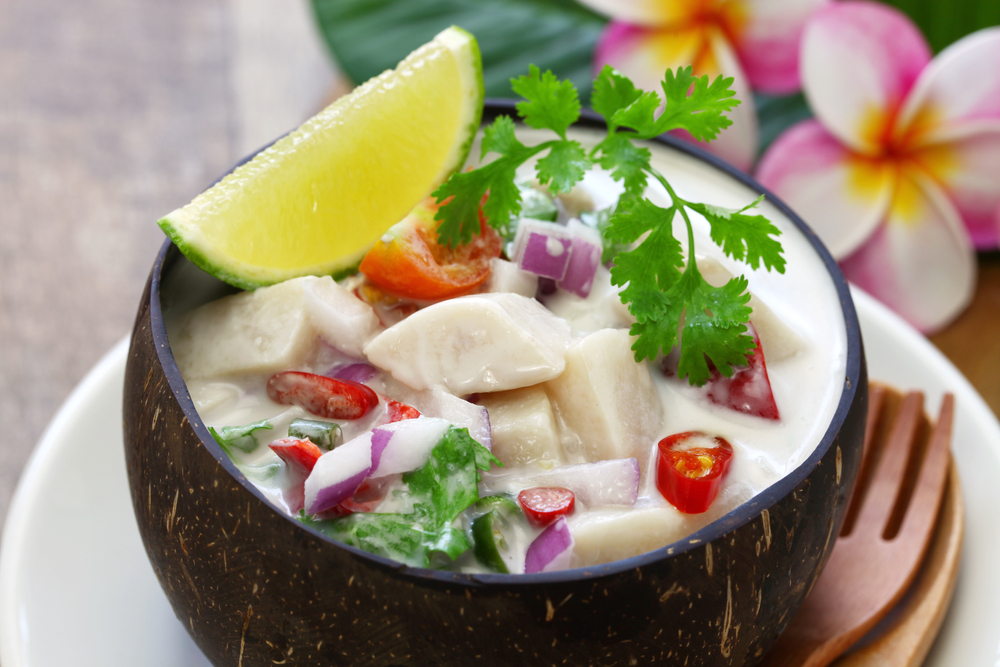Kokoda: Fiji’s Zesty Raw Fish Delight Infused with Coconut
With every bite of Kokoda, you’re transported to the idyllic beaches of Fiji, where the rhythm of the waves matches the heartbeat of its people. This raw fish salad, marinated in zingy citrus and enriched with creamy coconut milk, encapsulates the Fijian islands’ soul and culinary prowess.
Kokoda’s Place in Fijian Celebrations
A fixture in Fijian feasts and gatherings, Kokoda is synonymous with celebrations. From weddings to welcoming ceremonies, this dish’s presence signifies joy, unity, and the shared love for the island’s bounties. Its preparation often turns into a communal activity, further fostering bonds and shared memories.
Fiji’s Oceanic Connection Mirrored in a Dish
Fiji, with its intricate maze of islands, is bound intrinsically to the ocean. Kokoda pays homage to this bond, championing fresh catch marinated to perfection, a reflection of the islands’ respect for and reliance on marine life.
Essential Ingredients and Flavorful Additions
- Fresh fish (like mahi-mahi or tuna) – 500 grams, boneless and diced
- Lime or lemon juice – enough to cover the fish
- Coconut milk – 1 cup, freshly squeezed if possible
- Tomatoes – 2, diced
- Cucumber – 1, diced
- Red onions – 1, finely chopped
- Green or red chili (optional) – 1, finely chopped
- Salt – to taste
- Coriander leaves – for garnish
Flavorful Additions:
– Some versions include bell peppers for added crunch and color.
– Grated ginger can be added for a zesty kick.
Preparation Steps and Culinary Tips
- Marinating Fish: Place the diced fish in a bowl and cover with lime or lemon juice. Refrigerate for 2-4 hours. The fish will turn opaque, indicating it’s “cooked” by the citrus juice.
- Draining and Mixing: Drain off the excess citrus juice. Add coconut milk, tomatoes, cucumber, onions, and chili to the fish. Mix gently to combine.
- Seasoning: Season with salt and let the mixture sit for about 10 minutes to let the flavors meld.
- Serving: Serve in individual bowls, garnished with coriander leaves. Kokoda is best enjoyed chilled, offering a refreshing burst of flavors.
Culinary Tips:
– Always use fresh fish for this dish, as it’s consumed raw.
– If the coconut milk is too rich, it can be diluted with a little water.
Kokoda and Fiji’s Culinary Evolution
While Kokoda has its roots in traditional Fijian cuisine, it has seen variations and evolutions over time. Whether it’s the addition of new ingredients or the fusion of techniques from neighboring cuisines, Kokoda stands as a testament to Fiji’s dynamic culinary landscape, continually evolving yet deeply anchored in tradition.

Concluding Remarks
Kokoda, in its refreshing simplicity, offers a window into Fiji’s heart. As the flavors dance on your palate, you’re not just tasting a dish but experiencing Fiji’s vibrant culture, its respect for nature, and its unparalleled hospitality.
Frequently Asked Questions (FAQs)
- Can I use any fish for Kokoda?
- While you can technically use any fish, it’s best to opt for firm white fish varieties that hold up well to marinating.
- How long can I store Kokoda?
- Kokoda is best consumed fresh, but if necessary, it can be refrigerated for up to 24 hours. Beyond that, the fish might become overly soft from the citrus.
- Is there a vegetarian version of Kokoda?
- While the essence of Kokoda is raw fish, a vegetarian version could incorporate firm tofu or heart of palm as a substitute, offering a similar texture.
Kokoda captures the essence of Fijian tropical flavors. Embark on a wider culinary adventure with our detailed Oceania food map.
